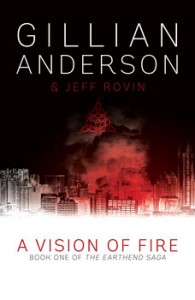lip lit: a vision of fire
As Agent Dana Scully says in The X-Files: ‘It’s a good story, Mulder, and very well told, but I don’t believe it.’
Gillian Anderson’s debut novel A Vision of Fire, co-written with prolific author Jeff Rovin, spins a rocketing tale of political crisis, Norse mythology and the search for a lost civilisation. Child psychologist Dr Caitlin O’Hara is hired to work discretely with the daughter of the Indian ambassador, Maanik Pawar, who in the midst of violent episodes has begun speaking a language not even Benjamin Moss (UN translator and old friend of O’Hara) can identify.
In hearing of a woman in Haiti seemingly drowning on dry land, and a teenager in Iran setting fire to himself, Caitlin stumbles upon a series of connections between the cases. All three tell of fire, ‘white light being eaten by the red light’, and the same strange triangular symbol begins to emerge in sketches. As Caitlin starts to share nightmarish visions with her patients, she sinks deeper and deeper into a contemplation of the mystical afterlife and ultimately finds her own reliance on logic and the physical world brutally shaken. It is fair to say that Caitlin emerges from the novel’s catastrophic climax a very different person than she was at the beginning—and well prepared for the next two instalments of the Earthend trilogy.
Unfortunately, for me the suspension of disbelief did not hold the whole way through. For a character so integrally faithful to reasonable explanations, Caitlin’s spiritual epiphany comes a little too soon, and far too powerfully. As epiphanies are sudden by nature, I was willing to go along with it—until, on the plane back from Iran, Caitlin taps into ‘the transpersonal plane’ to will Maanik’s soul to hold on until she returns. And it works.
If Caitlin had been a spiritual sort from the beginning this might almost have been okay—but as a scientist? This new world of souls and past collective experience is hurled so powerfully at the reader after this point that science basically checks out. Anderson has written two halves of two very different books. As this is her debut novel, we are inclined to forgive her, but under the guidance of Jeff Rovin I was expecting the worlds of logic and spirituality to
There isn’t a lot to be said about the memorability of the characters, either. Anderson evidently draws a lot from Dana Scully in the creation of Caitlin; but unlike Scully, there is not much distinguishable about this protagonist. She is a single mother as well as a renowned career woman, and her repeatedly-stated ability to juggle the two led me into that dreaded mindset of ‘I don’t know how she does it!’ I didn’t want to think this; I wanted to admire her, not wonder at her success. But for all her talents, Caitlin’s lack of freshness turned her into a protagonist readers have seen many, many times before. Her only intriguing peculiarity is her deaf son, Jacob, and I’m hoping that his deafness will have some sort of meaning throughout the rest of the trilogy.
But don’t get me wrong. I really, really liked this book. And I do forgive Anderson and Rovin for twisting the plot into something I couldn’t quite believe, because despite this, the novel is a hugely exciting ride. It balances several storylines with ease, not only telling Caitlin’s story of Maanik and the mysterious world of Galderkhaan but also Benjamin Moss’s story, of his boss the Indian ambassador and the tension of India-Pakistan peace negotiations.
My favourite aspect of the book was the friendship between Caitlin and Ben. Entertaining without contradicting the plot; heart-warming without being cliché. I was quite disappointed when the two became intimate, as I thought their relationship had several curious facets without the need for romance; I am, however, hopeful that what was so lovely about their friendship will continue to shine through.
All in all, Anderson and Rovin have created a book which clashes with itself, which strays away from believability and which has injected much more excitement into plot than character. But as I finished off A Vision of Fire in only a few hours I can definitely testify that it is an exciting plot. Now that science has fully given over to the transpersonal realm of souls and mythology, I am slightly concerned about facing my suspension of disbelief in the next instalment. But I am looking forward to trying.



Excellent review! Sounds like it’s worth checking out.
Pingback: Review: A Vision of Fire by Gillian Anderson & Jeff Rovin – J. M. Miller